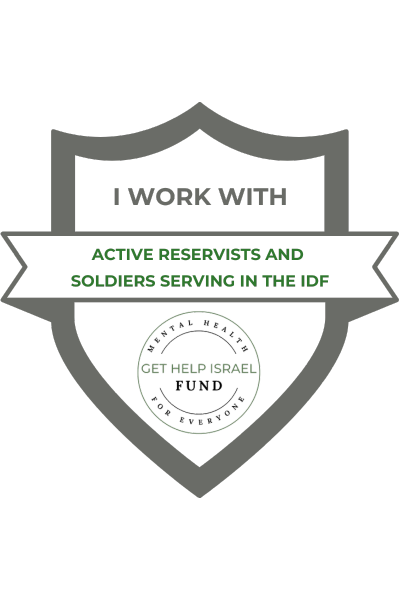Tracey Farber
Credentials
Finances
Licensed in Israel
- 43 Yishkon Street, Kerem Hataymanim
- Tel Aviv
- Email Me
-
 Business HoursEvenings
Business HoursEvenings
Tracey Farber
 Verified
Verified
Credentials
Clinical Psychologist
MA, BSW, PhD
Finances
350-500 NIS
None
Student Discount
ABOUT THE THERAPIST
After 24 years of clinical experience I would say that hope is a central feature of my work as a psychotherapist. People who are traumatized and depressed or struggling with relationship problems often feel stuck in the dark; I understand that people need grounded hope to help them to cope with difficult life challenges. I work with adults, adolescents and students who I see for in depth psychotherapy. In addition, I specialize in working with trauma. Often people who have experienced childhood trauma find themselves getting stuck in cycles of abuse. Adults who have experienced trauma for the first time often cannot get away from troubling memories that feel like ongoing nightmares and this interferes with enjoying being in the present. I work with survivors of trauma and help them look at their feelings and experiences in a safe and empathic therapeutic space. My experience has taught me that when people feel deeply understood it is easier for them to find new and creative paths where they are able to access some mastery.
Traumatic bereavement such as sudden traumatic loss/grief is another area of specialization. In my PhD work with Holocaust survivors I was privileged to research traumatic loss. I have generalised my knowledge about Holocaust survivors to understand and work with clients with different experiences of traumatic grief such as children/teens who loose a parent or sibling suddenly or parents who loose children. Within the scope of trauma and grief I also work with second generation Holocaust survivors.
As a result of my PhD research I developed a model of resilience. Resilience means how we adapt to challenging circumstances and bounce back after trauma. I use this model to teach mental health workers, teachers, students and employees in the corporate world. I adapt my knowledge of resilience to all my psychotherapy work and aim to help people to adjust and adapt to life challenges.
QUALIFICATIONS
MA
University of the Witwatersrand
1997
BSW
University of the Witwatersrand
1989
PhD
University of the Witwatersrand
2019
Degree
MAEducation
University of the WitwatersrandYear of Graduation
1997Degree
BSWEducation
University of the WitwatersrandYear of Graduation
1989Degree
PhDEducation
University of the WitwatersrandYear of Graduation
2019Years in Practice
27
REGISTERED PSYCHOLOGIST IN ISRAEL
Registration in Pinkas Hapsichologim
27-162012
Mumche Category
Clinical Psychologist
Mumche License Number
27-43788
DISTANCE COUNSELING
Online Therapy
PRIMARY SPECIALTIES
Grief
Personality Disorders
Sexual Abuse / Rape
Trauma / Post Traumatic Stress Disorder PTSD
ADDITIONAL SPECIALTIES
Adjustments
Child Abuse
Depression
Domestic Violence
Life Transitions
Mood Disorders
Postpartum Depression
Self-Harm / Suicide
Spiritual Concerns
CLIENT FOCUS
Population
Adolescents
Adults
Men
Women
Languages Spoken
Hebrew
English
TREATMENT APPROACH
Psychodynamic TherapyPsychodynamic therapy is a form of therapy that focuses on the unconscious mind and how it affects behavior. It works to help people understand and work through past experiences and feelings that may be causing difficulties in the present. This type of therapy encourages individuals to explore their emotions, relationships, and behaviors in order to gain insight into their current difficulties. It can help individuals better understand themselves and their motivations, and gain insight into how past events have impacted their current lives. People tend to develop defense mechanisms when faced with challenges in life. Defense mechanisms may keep painful feelings, memories, and experiences in the unconscious. A few common defense mechanisms include: denial, repression, and rationalization. Psychodynamic therapists encourage people to speak freely about their emotions, desires, and fears. Being open may help uncover vulnerable feelings that have been pushed out of conscious awareness. According to psychodynamic theory, behavior is influenced by unconscious thought. Once painful feelings are brought forth and processed, the defense mechanisms are no longer needed and a person in treatment can start changing unhelpful patterns when coping with life’s challenges.
Relational PsychotherapyRelational psychotherapy is a form of psychotherapy that focuses on a person’s relationships with others and the dynamics between them. It emphasizes the importance of the therapeutic relationship between the client and the therapist, and it explores the meaning and purpose of relationships in the client’s life. Relational psychotherapy seeks to understand how the client’s past relationships shape their current experiences and how the client interacts with others. The goal is to help the person develop healthier relationships and better communication skills so they can become more emotionally connected to others.
SERVICES OFFERED
Individual Therapy
Group Therapy
Hadrachat Horim
Workshops/Educating
PROUD PARTICIPANT

Therapist's Experience with Gap Year Students
I have worked extensively with students over the four year period of my Aliyah. I have worked with students who struggle to adjust as well as those who suffer from depression/anxiety. I run workshops at Young Judeah on Building Resilience. I specialise in psychotherapy and trauma
 Verified
Verified



